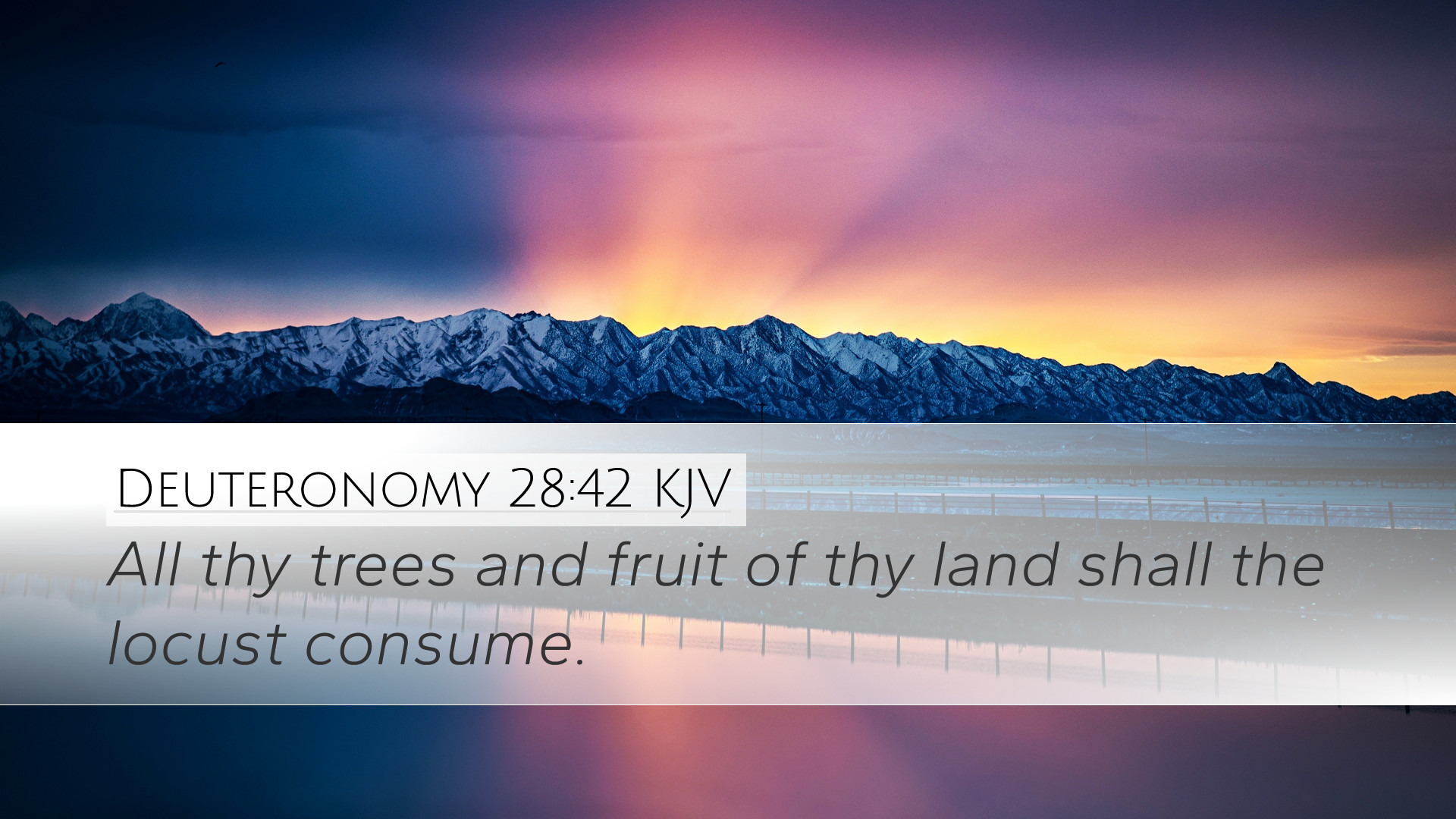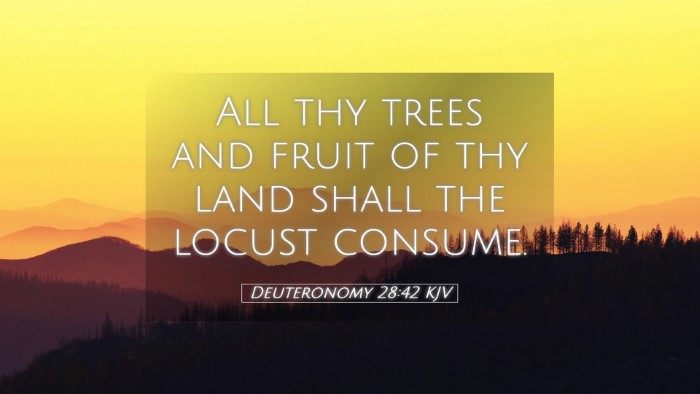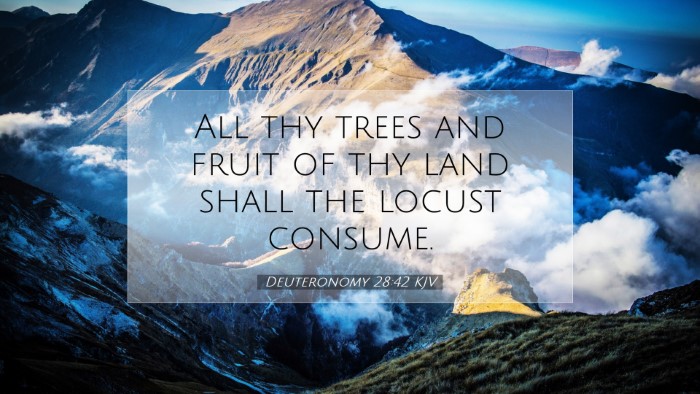Commentary on Deuteronomy 28:42
Verse: "All thy trees and fruit of thy land shall the locust consume."
In this verse, we find a profound reflection of the consequences of disobedience and the divine judgment that could follow. Throughout Deuteronomy, particularly in Chapter 28, the blessings for obedience and the curses for disobedience are laid out clearly. This particular verse falls under the curses, serving as a warning and an admonition to the Israelites.
Overview of the Context
The context of this verse is critical in understanding its significance. Deuteronomy 28 contrasts the blessings that Israel would enjoy should they obey God's commandments with the curses that would befall them if they turned away from His statutes. The chapter opens with a promise of prosperity and protection, while it culminates in dire warnings, emphasizing that rebellion will lead to calamity.
Exegesis of Deuteronomy 28:42
1. The Symbolism of Trees and Land:
This verse speaks of "all thy trees and fruit of thy land." In biblical literature, trees often symbolize vitality and sustenance. They represent God’s provision for His people. When God promises to bless His people, it includes granting them fruitful harvests and healthy trees. However, divine judgment manifests in the removal of these blessings, shown here as locusts consuming what was once bountiful.
2. The Locust as a Judgment Tool:
Locusts are significant in the biblical narrative, representing devastation and divine judgment. Their swift and overwhelming invasion serves as a vivid image of impending disaster due to God's displeasure. The prophet Joel, for example, vividly depicts a locust plague as an expression of God's judgment upon the people (Joel 1:4). Here, in Deuteronomy 28:42, locusts symbolize the loss of security and provision, which would have severe implications for the agricultural society of ancient Israel.
Insights from Public Domain Commentaries
Matthew Henry:
Matthew Henry interprets this verse within the broader scope of God's covenant with Israel. He highlights that disobedience leads to spiritual barrenness reflected in a physical lack. The devastation of crops would be a constant reminder of their failure to adhere to God’s commands. Henry emphasizes the faithfulness of God in fulfilling both His promises of blessing and His warnings of curses. This serves as a crucial lesson for the modern believer about the seriousness of sin and the consequences that follow.
Albert Barnes:
Albert Barnes expounds on the notion that the consumption of crops by locusts signifies loss not just in the material sense but also spiritually and culturally for Israel. He notes that such calamities would lead to a broader moral decline among the people. Barnes points out that the locust plague is indicative of a lack of protection over God's people, underscoring the importance of maintaining a covenant relationship with God to ensure His favor and protection.
Adam Clarke:
Adam Clarke provides a detailed examination of the locusts' characteristics as a judgment symbol. He states that locusts, due to their destructive nature, are emblematic of complete ruin. Clarke also emphasizes the spiritual implications of such a loss, indicating that the presence of locusts implies the absence of divine blessings. He suggests that this verse, like others in the chapter, serves to awaken the consciousness of the people towards their reliance on God for sustenance and protection.
Theological Insights
The theological implications derived from Deuteronomy 28:42 are multifaceted. Firstly, the verse draws attention to the sovereignty of God in human affairs, particularly in the realm of nature and agriculture. When Israel strays from God, nature itself becomes a witness to their transgressions. This notion resonates in the New Testament, where Jesus reiterated that God’s providence is closely linked to human faithfulness.
Secondly, this verse can be seen as reflective of God’s righteousness. He is just in fulfilling His covenant obligations, both of blessing and cursing. The locusts consuming the harvest serve as a metaphorical purification process, where the divine warning insists on returning to obedience to restore broken fellowship.
Finally, this verse encourages reflection on communal responsibility. The sin of a nation, as illustrated here, leads to communal consequences. Contemporary readers may find a parallel in societal behaviors and the collective morality that influences the welfare of communities and nations.
Practical Applications
- Adherence to God’s Commandments: A consistent focus on living according to divine principles is essential to maintaining spiritual and physical blessings.
- Understanding Consequences: Believers are encouraged to contemplate the broader implications of their choices and behaviors, understanding how straying from God can affect not only their lives but the lives of others.
- Community Reflection: Churches and leaders are called to address moral failings, acknowledging how these may influence the community’s spiritual climate.
- Encouragement Through Adversity: In times of trial or spiritual drought, believers should reflect on their relationship with God, seeking to restore what may have been lost through disobedience.
Conclusion
As we conclude our examination of Deuteronomy 28:42, we are reminded of the importance of our covenant relationship with God. The vivid imagery of locusts consuming the harvest is a powerful testament not only of judgment but also of the urgent call to repentance and obedience. This verse challenges us to consider how our actions reflect our understanding of God’s provision and judgment, serving as an educational point for pastors, scholars, and students alike. Thus, let us carry this verse in our hearts, striving for a faithful walk that abides by God's commandments, ensuring we experience His blessings in every facet of our lives.


